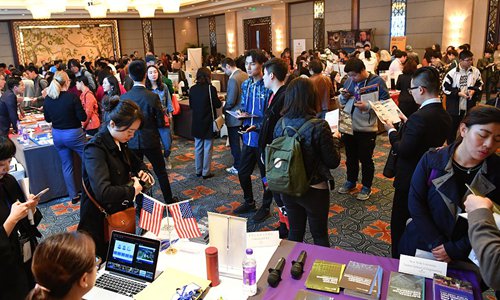The US has agreed to rescind a policy that would have deported international students who take online-only courses just one week after it was launched and caused a high-profile confrontation with Harvard University, MIT and other colleges. Chinese international students had expressed unease at the policy, saying they have realized the US hypocrisy over so-called democracy and human rights.

Over 60 US universities attend the forum to attract Chinese students in Chengdu, Sichuan Province on March 23, 2018. (Photo: VCG)
The policy, which was launched and withdrawn capriciously, was just the Trump Administration's attempt to gain votes in the upcoming presidential election and divert the public's attention from its failure in controlling COVID-19, said the students.
The US Immigration and Customs Enforcement (ICE) and Department of Homeland Security (DHS) on Tuesday agreed to rescind a policy that would have required international students to take in-person classes in order to remain in the country, US media reported.
The reversal came after ICE announced the policy on July 6, which would have affected more than one million international students.
The authority gave a detailed explanation of the new rule on July 7, saying if there are no in-person classes, the students will need to leave the country, although their student record can be maintained.
The policy sparked outrage among academics, with Harvard University and the Massachusetts Institute of Technology (MIT) on July 8 suing the Trump administration in federal court, seeking to stop the order.
Due to fears over the COVID-19 pandemic, many US schools have launched online-only courses. However, in response to the new policy, universities launched plans to offer more offline learning in the fall semester while many of them, including Harvard and MIT, filed a litany of lawsuits seeking to block the policy.
A Chinese student at Parsons School of Design, who gave her name as "Julie", told the Global Times that the reversal of the policy is the result of the efforts of many schools, student organizations, and teachers fighting for the policy to be corrected.
"This is a significant victory," Harvard's president said in a statement.
Julie said she was not that shocked when she first heard about the policy because "anything can happen in the US these days," but at the same time she felt very anxious, depressed and even regretted staying in the country when the pandemic started.
Julie said 44 percent of students at her school are international students.
After the policy was launched, Julie found that the earliest flight back home she could book was in October, and her visa would have expired before that.
Julie found that students who had returned to China had found internships and their lives have returned to normal. However, "if the visa policy can't be changed, and I can't return to China on schedule, I would have a stigma of being an illegal overstayer."
Julie has also witnessed the social unrest in the US, including the nationwide demonstrations and riots after African American George Floyd was suffocated to death by a white police officer on May 25, further understanding the hypocrisy of the country that boasts about "democracy and human rights first." Julie said the truth is that the country's politicians put their interests first.
"The politicians play hard only to win the presidential election, which in essence should be for the sake of the country and the people, but now they just leave the country and the people in a lurch, putting the cart before the horse.
That is really the supremacy of capital. I didn't expect them to be so blatant in their pursuit."
Like the majority of students, Julie has decided to hurry back to China after graduation, despite originally planning to work in the US for several years.


